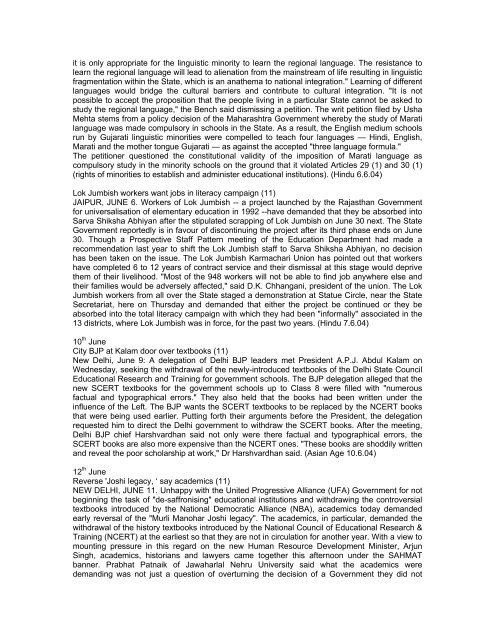EDUCATION - 2004 - Indian Social Institute
EDUCATION - 2004 - Indian Social Institute
EDUCATION - 2004 - Indian Social Institute
Create successful ePaper yourself
Turn your PDF publications into a flip-book with our unique Google optimized e-Paper software.
it is only appropriate for the linguistic minority to learn the regional language. The resistance to<br />
learn the regional language will lead to alienation from the mainstream of life resulting in linguistic<br />
fragmentation within the State, which is an anathema to national integration." Learning of different<br />
languages would bridge the cultural barriers and contribute to cultural integration. "It is not<br />
possible to accept the proposition that the people living in a particular State cannot be asked to<br />
study the regional language," the Bench said dismissing a petition. The writ petition filed by Usha<br />
Mehta stems from a policy decision of the Maharashtra Government whereby the study of Marati<br />
language was made compulsory in schools in the State. As a result, the English medium schools<br />
run by Gujarati linguistic minorities were compelled to teach four languages — Hindi, English,<br />
Marati and the mother tongue Gujarati — as against the accepted "three language formula."<br />
The petitioner questioned the constitutional validity of the imposition of Marati language as<br />
compulsory study in the minority schools on the ground that it violated Articles 29 (1) and 30 (1)<br />
(rights of minorities to establish and administer educational institutions). (Hindu 6.6.04)<br />
Lok Jumbish workers want jobs in literacy campaign (11)<br />
JAIPUR, JUNE 6. Workers of Lok Jumbish -- a project launched by the Rajasthan Government<br />
for universalisation of elementary education in 1992 --have demanded that they be absorbed into<br />
Sarva Shiksha Abhiyan after the stipulated scrapping of Lok Jumbish on June 30 next. The State<br />
Government reportedly is in favour of discontinuing the project after its third phase ends on June<br />
30. Though a Prospective Staff Pattern meeting of the Education Department had made a<br />
recommendation last year to shift the Lok Jumbish staff to Sarva Shiksha Abhiyan, no decision<br />
has been taken on the issue. The Lok Jumbish Karmachari Union has pointed out that workers<br />
have completed 6 to 12 years of contract service and their dismissal at this stage would deprive<br />
them of their livelihood. "Most of the 948 workers will not be able to find job anywhere else and<br />
their families would be adversely affected," said D.K. Chhangani, president of the union. The Lok<br />
Jumbish workers from all over the State staged a demonstration at Statue Circle, near the State<br />
Secretariat, here on Thursday and demanded that either the project be continued or they be<br />
absorbed into the total literacy campaign with which they had been "informally" associated in the<br />
13 districts, where Lok Jumbish was in force, for the past two years. (Hindu 7.6.04)<br />
10 th June<br />
City BJP at Kalam door over textbooks (11)<br />
New Delhi, June 9: A delegation of Delhi BJP leaders met President A.P.J. Abdul Kalam on<br />
Wednesday, seeking the withdrawal of the newly-introduced textbooks of the Delhi State Council<br />
Educational Research and Training for government schools. The BJP delegation alleged that the<br />
new SCERT textbooks for the government schools up to Class 8 were filled with "numerous<br />
factual and typographical errors." They also held that the books had been written under the<br />
influence of the Left. The BJP wants the SCERT textbooks to be replaced by the NCERT books<br />
that were being used earlier. Putting forth their arguments before the President, the delegation<br />
requested him to direct the Delhi government to withdraw the SCERT books. After the meeting,<br />
Delhi BJP chief Harshvardhan said not only were there factual and typographical errors, the<br />
SCERT books are also more expensive than the NCERT ones. "These books are shoddily written<br />
and reveal the poor scholarship at work," Dr Harshvardhan said. (Asian Age 10.6.04)<br />
12 th June<br />
Reverse 'Joshi legacy, ‘ say academics (11)<br />
NEW DELHI, JUNE 11. Unhappy with the United Progressive Alliance (UFA) Government for not<br />
beginning the task of "de-saffronising" educational institutions and withdrawing the controversial<br />
textbooks introduced by the National Democratic Alliance (NBA), academics today demanded<br />
early reversal of the "Murli Manohar Joshi legacy". The academics, in particular, demanded the<br />
withdrawal of the history textbooks introduced by the National Council of Educational Research &<br />
Training (NCERT) at the earliest so that they are not in circulation for another year. With a view to<br />
mounting pressure in this regard on the new Human Resource Development Minister, Arjun<br />
Singh, academics, historians and lawyers came together this afternoon under the SAHMAT<br />
banner. Prabhat Patnaik of Jawaharlal Nehru University said what the academics were<br />
demanding was not just a question of overturning the decision of a Government they did not

















